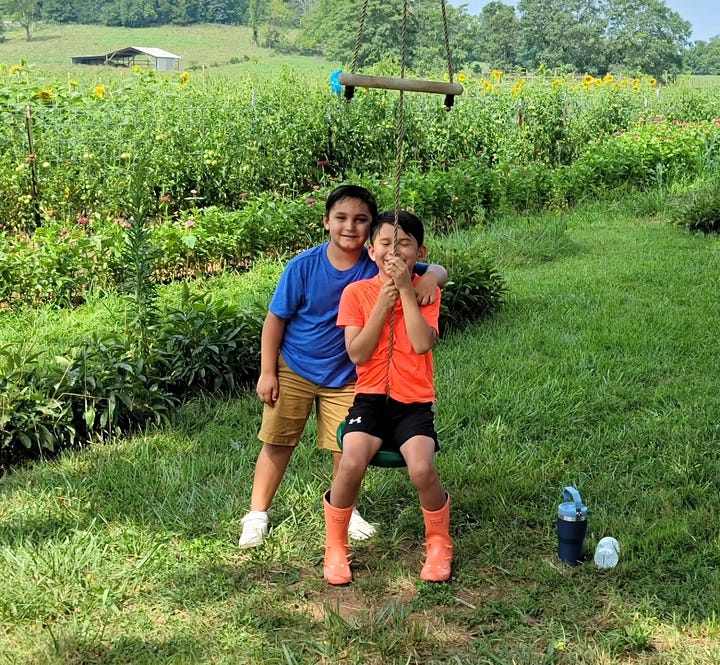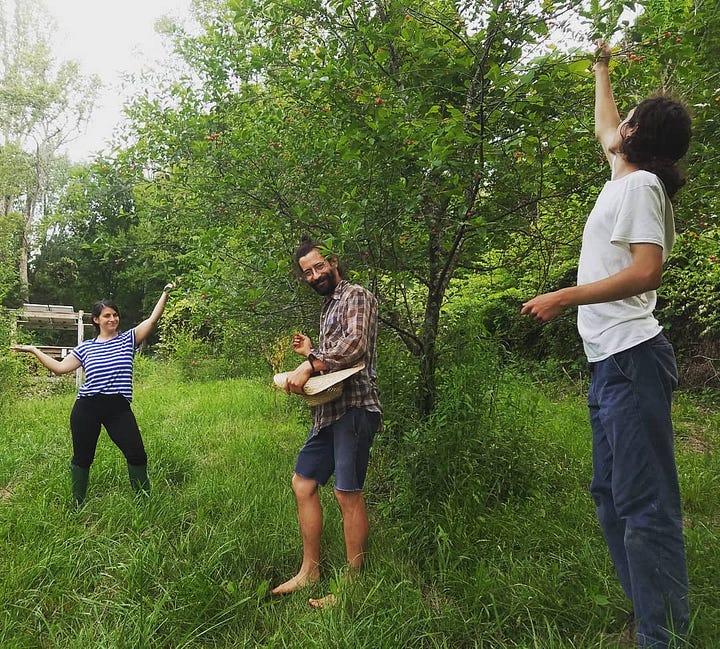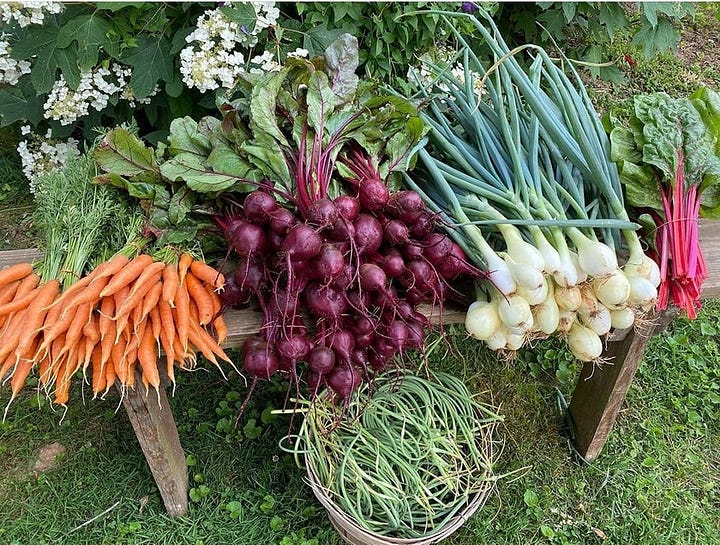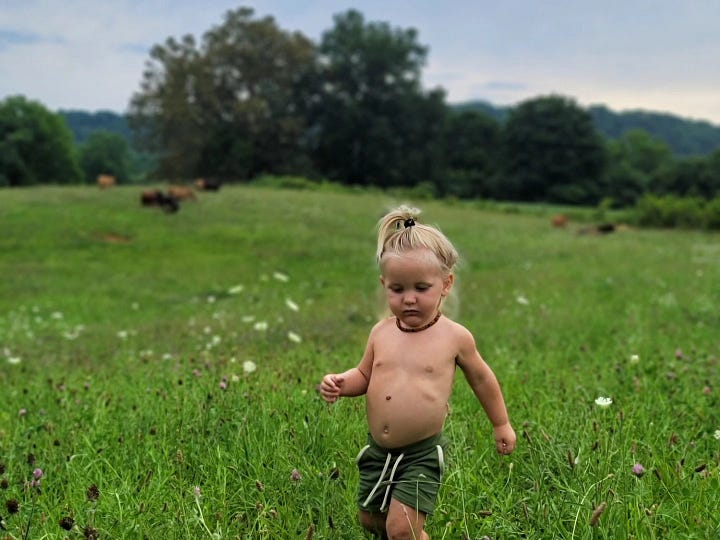Wildlands explores a variety of topics regarding health, well-being and connection with nature to shift paradigms, increase cooperation and reduce harm. When we do our piece of the peace to serve soils and souls, we help the regeneration of all our nations, all species included. Healthy soils lead to nutritious food for the wellness of our bodies, minds and spirits. We must protect and conserve our land and reciprocate with nature—all integral for our survival.
I met with Kristina Villa and Ian McSweeney, Co-Executive Directors of Farmers Land Trust. We spoke about the protecting farmland my partner and I own, as well as their work and mission, which is a noble one.
Farmers are stewards of the land, caretakers of our food, and they are losing ground, literally. Today, Wildlands guest writer, Darby Weaver of Farmers Land Trust, has an important message and mission to share with you, dear friends.
As a writer and a farmer, “Darby is passionate about using storytelling to uplift the work of communities reconnecting folx to the nourishment offered by regeneratively stewarded landscapes. Seeing nature as our ultimate teacher, Darby believes in transformation, and knows that the Farmland Commons model has the power to revolutionize modern land tenure and ownership. She sees this work as essential and recognizes that it can only be achieved through a de-colonized, community-centered approach that values the sentience and spirit of the land and protects the rights of the people who share it.”
Tied to the Land
Written by Darby Weaver of Farmers Land Trust
Walking along my potato crop, I brush through the deep green leaves with my hands, swishing the plants back and forth. Just the other day I noticed the first stages of a full-on assault by the Colorado potato beetles, and today their chubby larvae gain on the nutritious leaves. As I get older, I have less of a stomach for total eradication. My compromise is to wake every morning and swish them off the plants, a process I will repeat continuously. The squishy, glutinous pests will likely eat, fall, and eat again, but this simple dance we share ensures that I too will eat at harvest.
These quiet moments of observation among the season’s crops anchor me into the present. The wildness of the Earth is fully aroused after the summer equinox, and our cultivated spaces are chaotically tied to the humming, pulsating fabric of life that shares sentience and nourishment. Our carefully tended plants become nested into the ecological system of niches that offer multitudes of friends and foes, and we do our best just to keep up with the season’s unfolding.
Growing food in communion with the natural world is a gift, and not just when the fruit comes in. To be so deeply intertwined with life is an illuminating experience. Choices made and actions taken in the garden have visible effects that spread throughout the landscape. Abundance can be called upon by supporting the seeming endlessness of biodiversity from the subsoil to the atmosphere. Connection becomes tangible and a sense of community and belonging takes root at the living intersections of the six kingdoms of nature.
In our modern world, this sense of oneness with our living Earth is an experience that fewer among us are able to claim. As our technologies advance and our virtual reality grows, our connection to curated content and instant communication masks our disconnection from the natural world that keeps us. Industry has become global and capitalism has seemingly solidified its reign over our culture and planet. Farming has become concentrated and commodified, and the concept of the home garden has been traded out for “gardening,” a highly marketable and luxurious hobby that many people cannot afford with their dollars or their time.


The Agricultural Crisis
Those who do choose to tend to crops and feed their communities outside of the influence of corporate, mechanized agriculture, are forced to sacrifice many of the support structures secured by a nine-to-five job such as financial stability, access to healthcare, and options for retirement. A livelihood derived from the well-being of the land is a beautiful expression of life, but a vulnerable one.
These challenges are further compounded by the rising cost of land and land taxes. As an elder farmer begins to navigate the difficult emotions and realities of transitioning away from farming, they are often forced to sell their life’s work into the commercial real estate market. This market does not place any value on the gradual and measured development of vitality built by insightful and dedicated land stewardship. This market will sell the property to the highest bidder and it is often the case that the farm is built over, or maybe worse, becomes a semi-preserved relic with a dedicated mowing team and empty barn.
Every year since 1935, the United States has been losing farmland. Down from almost seven million farms counted in the 1935 USDA Agricultural Census[1], the USDA counted just two million farms in their 2022 survey. This loss can be attributed to many factors, including two major contributors: farm consolidation and development. According to the American Farmland Trust[2], the United States is losing 2,000 acres of farmland a day to low-density residential sprawl.
When a farm is sold into development, it is not only the productive land that is lost. The biodiversity that had been cherished and protected on the land is lost, the deep wisdom of the land gleaned carefully by the farmer fades away, and the community of people—who derived sustenance from the farmer’s efforts—are forced to find nutrition elsewhere. This unraveling of our agricultural heritage has consequences that are woven throughout our modern world.
Issues of this magnitude can be difficult to face, let alone remedy. The agricultural crisis in the United States and beyond is a vast and all-encompassing beast. From climate change to food access, land access to systemic racism and oppression, the challenges are many, and most have historic roots. Even so, through acknowledgment and accountability, this crisis has the potential to awaken us to the ways in which privileged cultures have favored comfort over equity and justice. As those with means have chosen to lean into consumer culture and away from shared resources and labor, sustainability and community, we have all been opened up to power dynamics that do not have our best interests, or the planet’s, in mind.
But how do we find our way back? The social, economic, and legal structures of today feel set in stone. It is difficult to imagine a different way forward. Just like the caterpillar taking its last bite of milkweed plant that has been turned to lace, it feels as though our human family has outgrown its earthly home. Fortunately, just like the caterpillar, transformation is an inherent miracle of nature, and it only takes one imaginal cell to build a new reality.


The Farmers Land Trust
Small-scale, regenerative farming has been the way of life for myself and my husband since we entered adulthood. Waking up to check on the potatoes, beans, or kale is a gift we’ve given ourselves over other things like commuting and vacations. We’ve had triumphs and failures and mostly eked by with limited income, no health insurance, and no real plan for our elder years. We’ve had help along the way, several times, and even so, there have been instances where we’ve taken off-farm jobs and questioned our life choices. Buying a piece of land through funds generated solely by farming is not impossible, but it has never been easy and is getting more and more difficult to accomplish each year.
In addition to the hurdles we faced attempting to secure our piece of land to farm, we have never known how we might ensure that the work we’ve put into our land is continued by a farmer with an aligned vision. Through a combination of infertility and limited means, we have no children to carry forward our legacy here. Even if we did have kids, there’s no guarantee that their passions would lead them back to the land, as ours did for us.
It’s not simply the loss of farmland that feeds the agricultural crisis in the United States; there are also many barriers to transition. As elders need to sell their farms for top dollar in hopes of securing some form of retirement, young farmers are entering the real estate market with scant capital to spare. This disconnection continues to widen, and the situation feels increasingly hopeless when viewed through the lens of the current system of land ownership in this country.
Fortunately for all of us, the imagination needed to reinvent our outdated and exploitative models for land tenure and ownership has bloomed and is being carefully tended at The Farmers Land Trust. TFLT isn’t your typical land trust organization. While land trusts use conservation easements and other agreements to hold land and prevent development, they are often made up of stipulations for land use that limit the productivity of agriculture.
The Farmers Land Trust is not only working to protect farmland from development, but we are also prioritizing the preservation of the agricultural viability of the land through securing stewards whose practices focus on regenerative land use. We are accomplishing this through the development of a new land tenure model: the Farmland Commons.
The Farmland Commons is a completely open-source and dynamic arrangement generating a feasible path for farmers to retire from their operations with fair compensation for their real estate, while also honoring and valuing what their years of cultivation have contributed to the productivity and ecological integrity of their land.


Land as a Common Good
The team at The Farmers Land Trust, not only believe that land ownership should be held in community, they also believe it can be. The success of these efforts comes from combining forces with many different perspectives, generating a collective and deep understanding of raising funds, the current legal structures that govern the U.S. real estate market, and innovative ways of democratizing land ownership. Ian and Kristina see the nested model of collaborative organizations as an essential path forward for land ownership; they feel that community-led initiatives have the power to be successful because they mimic the momentous symbiosis that fuels the natural world.
Hope Grows Where It Is Tended
As a former young farmer now headed toward middle age, it feels as though my relationship with the world has softened and opened. When you realize how long the game truly is, it is easier to let go of some of the smaller things to make space for the bigger picture. My body, my mind, and heart have always been deeply invested in navigating what it means to be human within the context of the ecological miracle around us. My years of partnering with natural forces have been difficult and nourishing. Many of the challenges faced have been hardships levied from the controlling societal structures of the United States whose foundational concept of rugged individualism remains so prominent and so limiting. These ideals held by industry and culture in our country feel at odds with how the natural world builds and stores vitality.
The Farmers Land Trust is using nature as a blueprint for a more sustainable, just, and community-centered relationship with land. We are presenting a new path forward. By removing agriculture from the real estate hustle, it has time and space to accumulate multi-generational resilience. This builds resilience into not only the ecological scaffolding of our landscapes, but also within the human communities who tend it and share in the risks and rewards of regenerative land stewardship.
This different approach provides us not with a step backwards, but a step just outside of the consumptive and exploitative journey we’ve been on as a people. It is from this new place that we can integrate our lives back into the harmony that has always been available to us as creatures of this realm. We are not a disease on this Earth, ravaging and pillaging resources with no thought for tomorrow; or at least, we don’t have to be. There is comfort in remembering that we are a part of nature, and as such, we have within us the wisdom needed to reconnect to the syntropic life force that generates and brings balance to our living world.
Find out more and join us at thefarmerslandtrust.org.
Notes
[1] U.S. Department of Agriculture, “The Number of U.S. Farms Continues Slow Decline,” USDA Economic Research Service, February 29, 2024.
[2] Dr. Mitch Hunter, Dr. Ann Sorensen, Dr. Theresa Nogeire-McRae, Dr. Scott Beck, Stacy Shutts, Ryan Murphy, “Farms Under Threat 2040: Choosing An Abundant Future,” Washington, DC: American Farmland Trust, June 29, 2022.
About Wildlands
My great grandfather was a farmer and friends with President Truman. My great aunt babysat Truman’s daughter. Another grandfather invented the open case freezer. And, an ancestor fought in the American Revolution. My partner, a Physicist who is a Citizen of the Cherokee Nation and I now own farmland- land that his family has owned since 1902. Food, farming and freedom are infused in my life and restoration-conservation are a part of my Soul.
“A Poet with a Purpose” as a Wild and Free Nature Nomad, is growing organically- through art, poetry, essays on Wildlands and through Sustainable Tucson Habitat Restoration projects.
Read my Guest Column about agricultural conservation easement programs to help farmers restore soils and souls that help regenerate our nation.
Thank you, Kristina, Ian and Darby of Farmers Land Trust, for your important work and thank you Darby Weaver for being a guest writer in Wildlands. Please visit us with Part II!
Introspection and Action Steps for YOU:
What is your favorite food? Did you know that PFAS contaminated sewage sludge is used on farmlands? Ask your representative to protect farmland from all toxic chemicals, corrupt investors and development.
Do you or someone you know have land that could be protected in an agricultural conservation easement that could help farmers grow food, herbs and support native habitats?
What’s your story? Please contact me if you would like to share your mission in Wildlands.
Let’s YOUnite to keep our soils clean for our souls health and well-being. Together we create restored soils and souls and celebrate the regeneration of our nations. I appreciate your support to help me spread the seeds for peace and prosperity!






Thank you, @Darby Weaver, of The Farmers Land Trust, for your essential message. May your call carry far and wide to conserve the land that loves, nourishes and protects us!
Disabled, vetetan, been though hell and still gping. Regenerative farming is the only way to move tp a place of health, abundance and joy for all. I have been transforming, 1&1/2 acres from unused pasture to a no till farm. I had a visipn years ago and was told to create a sanctuary/community that fosters life! I was told to grow food and to share. This is my life now and cannot imagine foing anything else. Providing nutrient dense food, while nuturing the life in the soil and environment is the key to a bettrr future. It brings such joy to see the happiness, smiles and joy when someone tastes food that has been lovingly nurtured to its potential.
Namaste and Blessed Be